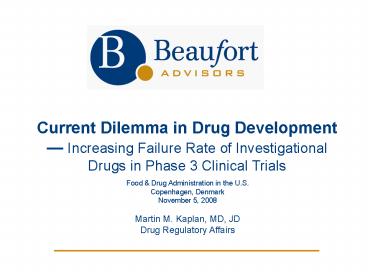Current Dilemma in Drug Development Increasing Failure Rate of Investigational Drugs in Phase 3 Clin - PowerPoint PPT Presentation
1 / 15
Title:
Current Dilemma in Drug Development Increasing Failure Rate of Investigational Drugs in Phase 3 Clin
Description:
Inclusion of patients with established biomarkers (e.g., Her2 breast tumors) 6 ... demonstrate drug efficacy due to fear of observing serious drug-related toxicity ... – PowerPoint PPT presentation
Number of Views:321
Avg rating:3.0/5.0
Title: Current Dilemma in Drug Development Increasing Failure Rate of Investigational Drugs in Phase 3 Clin
1
Current Dilemma in Drug Development Increasing
Failure Rate of Investigational Drugs in Phase 3
Clinical Trials
Food Drug Administration in the
U.S. Copenhagen, Denmark November 5, 2008 Martin
M. Kaplan, MD, JD Drug Regulatory Affairs
2
Failure Rates of Investigational Drugs in
Clinical Trials
- Historical algorithm for planning investigational
drug development - 9 of 10 drugs entering Phase 1 clinical trials
will fail - Historical timing of drug development failures
- 10 discontinuation in Phase 1
- 50-60 discontinuation in Phase 2
- 20-35 discontinuation in Phase 3
2
3
Failure Rates of Investigational Drugs in Phase 3
Clinical Trials (cont.)
- Failure rates of drugs in Phase 3 trials have
increased from 30 to 50 - Lack of efficacy vs. placebo (50)
- Safety concerns (30)
- Inability to differentiate either superior
efficacy or superior safety against relevant
comparators (20)
3
4
Causes of Drug Failure in Phase 3 Clinical Trials
- Extrapolating results from an enriched Phase 2
clinical trial to a broader study population in
pivotal Phase 3 trials - Overestimating drug effect or underestimating
variance
4
5
Enriched Study Designs
- Encouraged by FDA for many years
- Potential to increase size of drug effect, to
increase number of observed study events, and to
decrease heterogeneity of patient responses - Critical issue raised by FDA is
generalizability of results from an enriched
clinical trial - Phase 3 study design must balance outcome of
restricted indication in product labeling vs.
risk of failure in broader study population
5
6
Examples of Enriched Study Designs
- Elimination of placebo-responders in study
lead-in phase - Elimination of patients with advanced disease
that might not survive until study completion - Restriction of enrollment to pre-screened drug
responders - Inclusion of patients with established biomarkers
(e.g., Her2 breast tumors)
6
7
Causes of Drug Failure in Phase 3 Clinical Trials
(cont.)
- Selecting a previously untested drug dose for
Phase 3 after failure to identify a safe and
effective dose in Phase 2 trial - Too low dosing leading to failure to
demonstrate drug efficacy due to fear of
observing serious drug-related toxicity - Too high dosing leading to failure to
demonstrate an acceptable benefit/risk profile
7
8
Causes of Drug Failure in Phase 3 Clinical Trials
(cont.)
- Basing Phase 3 development on a Phase 2 per
protocol set or study completers analysis - Per Protocol Set Analysis
- Definition the set of data generated by the
subset of patients who complied with the protocol
sufficiently to ensure that these data would be
likely to exhibit the effect of treatment,
according to the underlying scientific model
8
9
Causes of Drug Failure in Phase 3 Clinical
Trials (cont.)
- Per Protocol Set Criteria completion of certain
pre-specified minimal exposure to the treatment
regimen availability of measurements of the
primary variable(s) absence of major protocol
violations - Critical issue FDA requires full analysis set
statistical analysis of data (consistent with
intent-to-treat principles) from pivotal Phase 3
trials in NDA submissions - Most common problem elimination of early
patient dropouts due to adverse events
9
10
Causes of Drug Failure in Phase 3 Clinical Trials
(cont.)
- Misuse of a retrospective subgroup analysis of
Phase 2 study results - Extrapolating results for a subgroup of
responsive patients that were not prospectively
defined for special evaluation in the Phase 2
clinical trial protocol to serve as the target
study population in pivotal Phase 3 trials
10
11
Examples of Late-Stage Drug Development Failures
- Oncology drugs make up the highest proportion of
late-stage development failures due to inability
to demonstrate clinical benefit in controlled
Phase 3 trials over standard of care (after
modest tumor response rates observed in
open-label Phase 2 trials) - Drugs developed for therapeutic indications such
as ischemic stroke and septic shock in which
Phase 3 studies are conducted in absence of
proof of concept in Phase 2 trials
11
12
Examples of Late-Stage Drug Development Failures
- Drugs that were continued into Phase 3 despite
early warning signals of drug toxicity (e.g.,
ximelagatran) - Drugs with unanticipated safety risks first
observed in Phase 3 trials (e.g., torcetrapib)
12
13
Examples of Late-Stage Drug Development Failures
- The remarkable saga of the U.S. development of
vesnarinone, a positive inotropic drug for
symptomatic congestive heart failure - Reduction in morbidity and mortality demonstrated
in initial Phase 3 trial (p 0.003) - FDA agrees to halting of second pivotal trial for
ethical considerations based on highly positive
first trial findings - FDA Cardio-Renal Drugs Advisory Committee meeting
recommends against approval, citing need for
confirmatory trial - Replication of results of first trial not
achieved
13
14
Conclusions
- Clinical drug development of new chemical
entities with novel mechanisms of action entails
high risks and costs - Critical Go or No Go decisions to conduct Phase
3 clinical trials must be based on a rigorous
evaluation of available preclinical and clinical
data, including an understanding of limitations
of certain statistical analytic methods - Risk of failure in Phase 3 trials may be reduced
by maintaining use of enriched study designs in
clinical trial protocols
14
15
Beaufort Advisors LLC 500 East Main Street Suite
1301 Norfolk, Virginia 23510 (757)
383-6000 www.beaufortadvisors.com































